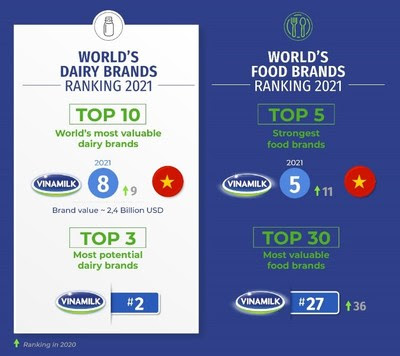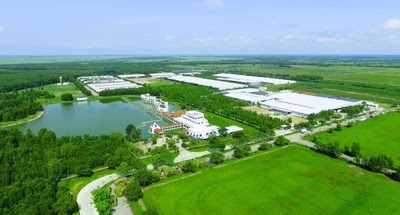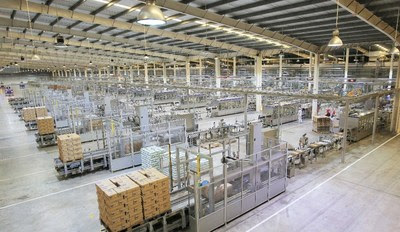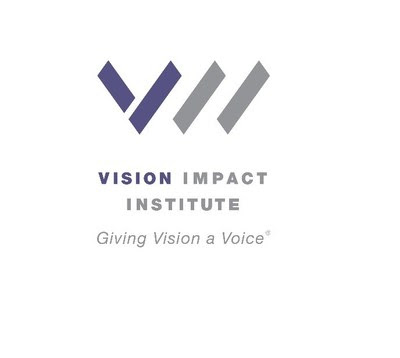HO CHI MINH CITY, Vietnam, 5 octobre 2021 /PRNewswire/ — La Vietnam Dairy Products Joint Stock Company (Vinamilk) est devenue l’une des marques laitières les plus précieuses au monde, avec une valeur de marque de US$ 2,4 milliards selon le rapport Brand Finance de 2021. La société s’est également classée parmi les premières places dans trois autres classements mondiaux de l’alimentation et des boissons cette année.
Brand Finance est le principal cabinet indépendant de conseil en stratégie et en évaluation de marques basé au Royaume-Uni. Chaque année, il évalue 5 000 des plus grandes marques mondiales dans 23 secteurs et les classe en fonction de divers critères.
Cette année, Vinamilk est le seul représentant de l’ANASE à avoir obtenu des positions élevées dans quatre classements de Brand Finance, y compris les marques de produits laitiers ayant le plus de valeur au monde, les marques de produits laitiers ayant le plus de potentiel et le classement des marques alimentaires les plus fortes et les plus précieuses.

Ce résultat met en évidence le potentiel de croissance de Vinamilk et sa résilience face aux défis de la pandémie de COVID-19, notamment la perturbation de la chaîne d’approvisionnement mondiale, la baisse de la demande de produits et la modification des habitudes de consommation.
L’entreprise a également été récemment placée à la 36e place du Top 50 des producteurs laitiers mondiaux en 2021 de Plimsoll, en fonction du chiffre d’affaires, devenant ainsi la seule entreprise d’Asie du Sud-Est à figurer sur cette liste prestigieuse.
« Après 45 ans de développement continu, Vinamilk a atteint une position remarquable dans les classements mondiaux en termes de revenus et de valeur de la marque. Ces résultats témoignent de nos réalisations et renforcent considérablement notre engagement à nous efforcer encore davantage, en créant les produits les plus nutritifs pour les consommateurs nationaux et internationaux et en faisant progresser la marque de produits laitiers vietnamienne sur le marché mondial », a déclaré Mme Mai Kieu Lien, PDG de Vinamilk.
En plus de maintenir une production et une activité stables, Vinamilk mène activement des campagnes communautaires pour promouvoir un mode de vie sain et a intensifié la lutte contre la COVID-19. Vinamilk a soutenu le pays et la communauté internationale par des financements, des dons de vaccins et plus de 6 millions de produits d’une valeur estimée à 4,2 millions de dollars.
Vinamilk maintient sa dynamique de croissance au milieu de la pandémie

Vinamilk possède actuellement 16 usines, 13 fermes laitières dans le monde et un projet de complexe laitier à grande échelle au Laos, qui fournit plus de 250 références de produits. Au milieu de la pandémie, Vinamilk a continué à maintenir un fonctionnement stable avec une croissance notable du volume des exportations. Au premier semestre 2021, la valeur des exportations de la société a été estimée à US$ 121,5 millions, affichant un taux de croissance à deux chiffres de 13,1 % par rapport à 2020.
En plus d’étendre sa portée internationale et de devenir l’une des 30 premières entreprises laitières au monde en termes de chiffre d’affaires, Vinamilk s’engage constamment dans la coopération internationale afin d’augmenter sa capacité de production tant au niveau national qu’international.

Vinamilk possède des filiales et des coentreprises aux États-Unis, en Nouvelle-Zélande, au Laos, au Cambodge et, plus récemment, aux Philippines par le biais d’une coentreprise avec Del Monte – le premier fabricant et distributeur de produits F&B des Philippines. En 2021, la société se fixe pour objectif un chiffre d’affaires de US$ 2,7 milliards, soit une augmentation de 4,1 % par rapport à l’année précédente.
À propos de VINAMILK
Fondée en 1976, Vinamilk est la première entreprise de nutrition du Vietnam, au service de clients dans 56 pays. Avec la mission de devenir une marque internationale dans le secteur de l’alimentation et des boissons et une marque de confiance pour les consommateurs de produits nutritionnels et de santé, Vinamilk s’engage à fournir des produits de haute qualité avec respect, amour et responsabilité pour la vie et la communauté.
Photo – https://mma.prnewswire.com/
Photo – https://mma.prnewswire.com/
Photo – https://mma.prnewswire.com/



